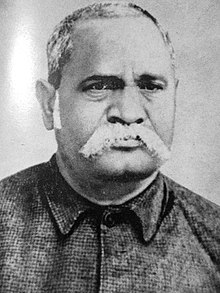Nathuram Sharma
Nathuram Sharma | |
|---|---|
 | |
| Born | 1859 Harduaganj, North-Western Provinces, British India |
| Died | 21 August 1932 (aged 73) Harduaganj, United Provinces, British India |
| Children | Hari Shankar Sharma |
| Website | |
| jaischauhan | |
Nathuram Sharma (1859 – 21 August 1932), better known by his pen-name Mahakavi Shankar, was a Hindi and Urdu poet from Harduaganj, Aligarh, North-Western Provinces (now Uttar Pradesh), British India. He worked with the Irrigation Department at Kanpur and subsequently as an Ayurvedic physician. His poetic works are primarily in the dialects of Braj Bhasha and Khariboli.[1][2][3] He was a writer of Modern Period.[4][5]
Early life[edit]
Shankar was born in 1859 in Harduaganj, Aligarh, North-Western Provinces (now Uttar Pradesh), British India, and received his early education at the local primary school.[2][3] In 1874, when he was a student of the Middle Class, English Educational Inspector E. T. Constable inspected the school. Constable was impressed with his talent and knowledge and commented in the inspection book: "Nathuram is an intelligent student, full of promise."[citation needed]
Shankar knew Sanskrit and Persian as well as Hindi and Urdu.[1] He was a contributor to Saraswati, the literary journal of Mahavir Prasad Dwivedi.[6][7]
Poetic works[edit]
Shankar's poetic works include: Anurag ratna, Shankar saroj, Garbhranda rahasya, Gitavali, Kavita kunj, Doha, Samasyapurtiyan, Vividh rachnayen, Kalit kalewar and Shankar Satsai. Influenced by the Arya Samaj movement, he was a social reformer who used his mastery of language effectively to this purpose.[1]
He was referred to as Mahakavi meaning Great Poet.[2][3]
Death[edit]
Shankar died on 21 August 1932 at Harduaganj, Aligarh, North-Western Provinces, British India.[2][3]
Lineage[edit]
Shankar was the father of Hindi poet Hari Shankar Sharma, grandfather of Hindi poet and writer Kripa Shankar Sharma and great-grandfather of Hindi poet Indira Indu.
Further reading[edit]
- History of Indian Literature: 1911–1956, Struggle for freedom: triumph and tragedy, Sisir Kumar Das (ed.), Sahitya Akademi: New Delhi (1995), p. 199, ISBN 81-7201-798-7
- Mahakavi shankara Smratiai Grantha which -Published by Mahakavi Sankar Smarka Samiti, Harduaganj (Aligarh), in 1986.[3]
- Nathurama Sharma Shankar ki kavya-sadhana by Vasanti Salavekara & Published by-Vinaya Prakashan in 1994[2]
- Vaidik Geetanjali by Deshraj Singh & Published by- Mahakavi Sankar Smarka Samiti, Harduaganj (Aligarh)in 2013[8]
References[edit]
- ^ a b c Pande, V.R. (1992). The Encyclopaedia Of Indian Literature. Vol. Five. Sahitya Akademi: New Delhi. p. 3971. ISBN 978-81-260-1221-3.
- ^ a b c d e Sālavekara, Vāsantī (1994). Nāthūrāma Śarmā Śaṅkara kī kāvya-sādhanā (in Hindi). Vinaya Prakāśana.
- ^ a b c d e Mahākavi Śaṅkara-smr̥ti-grantha (in Hindi). Mahākavi Śaṅkara-Smāraka Samiti. 1986.
- ^ "Culturopedia.com - Literature of India~ Hindi Literature". www.culturopedia.com. Archived from the original on 14 September 2001.
- ^ "Kaal Se Yug Tak". 23 January 2016. Archived from the original on 12 April 2021. Retrieved 14 April 2021.
- ^ K. M. George (1992). Modern Indian Literature, an Anthology: Surveys and poems. Sahitya Akademi. p. 149. ISBN 978-81-7201-324-0.
- ^ "Hindi Language and Literature, Hindi Literature, Hindi Language, History of Hindi Language, Language, Literature, Hindi".
- ^ "जिस्म समूचा सड़ा हुआ है शल्य चिकित्सा कौन करे".
External links[edit]
- BrandBihar.com poem in Hindi.
- Nathuram Shankar Sharma"Shankar" at KavitKosh Archived 20 February 2020 at the Wayback Machine
- [1]
- Nathuram Shankar Sharma "Shankar" at Hindi Sathiya.org Archived 10 October 2014 at the Wayback Machine
